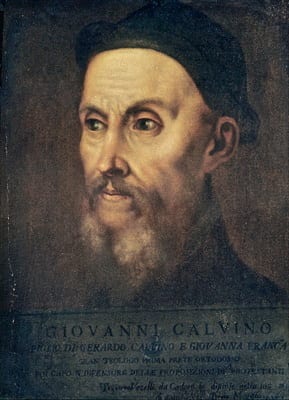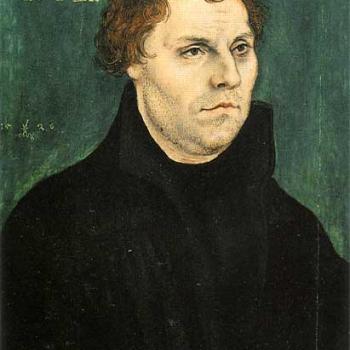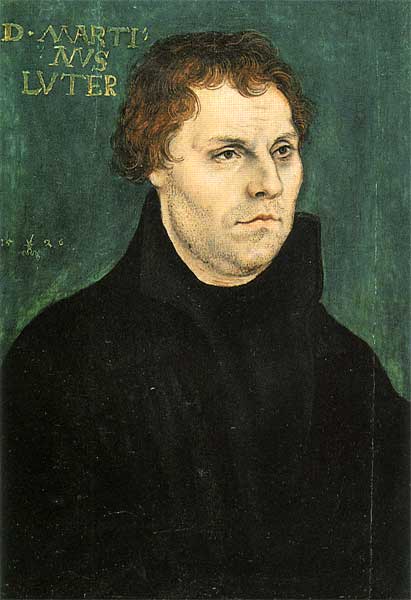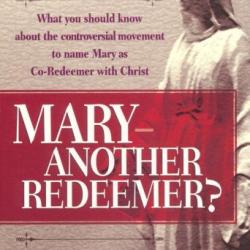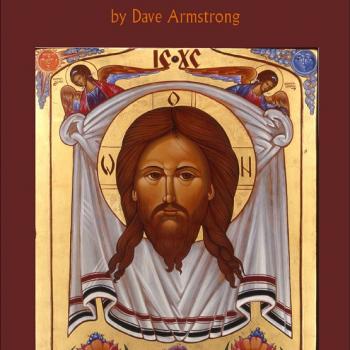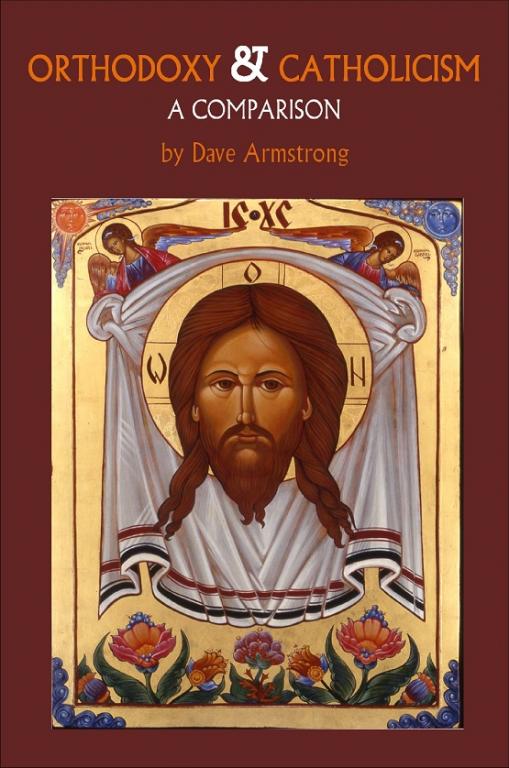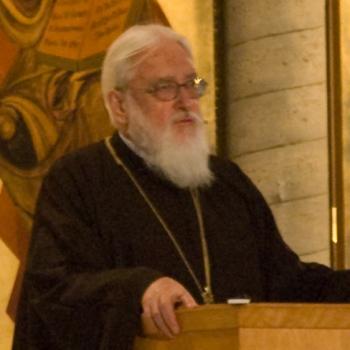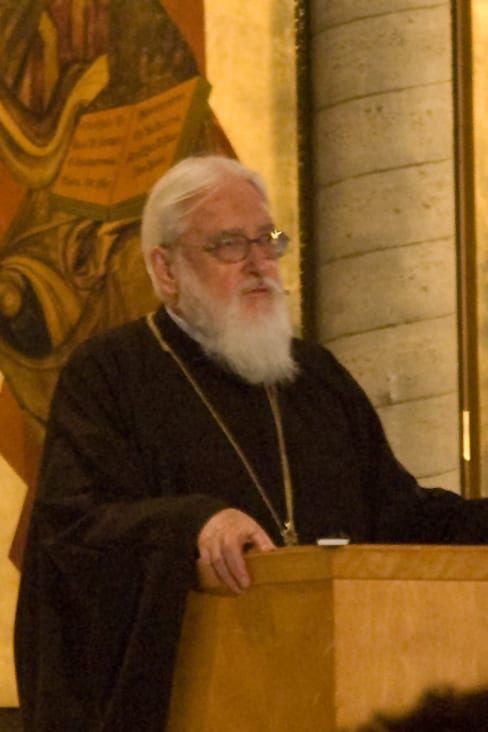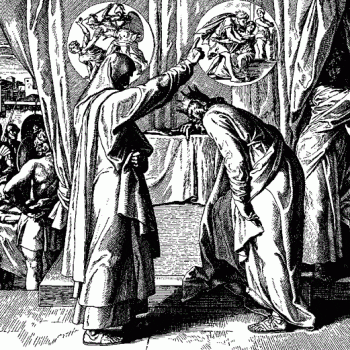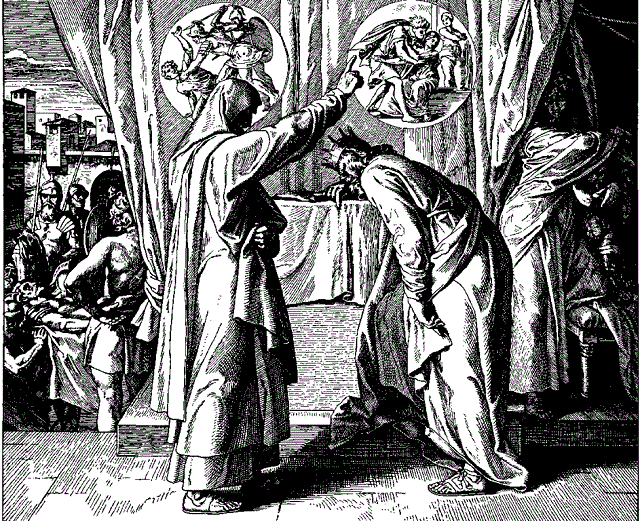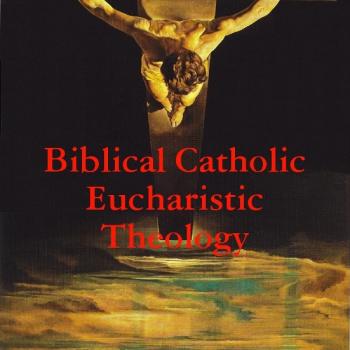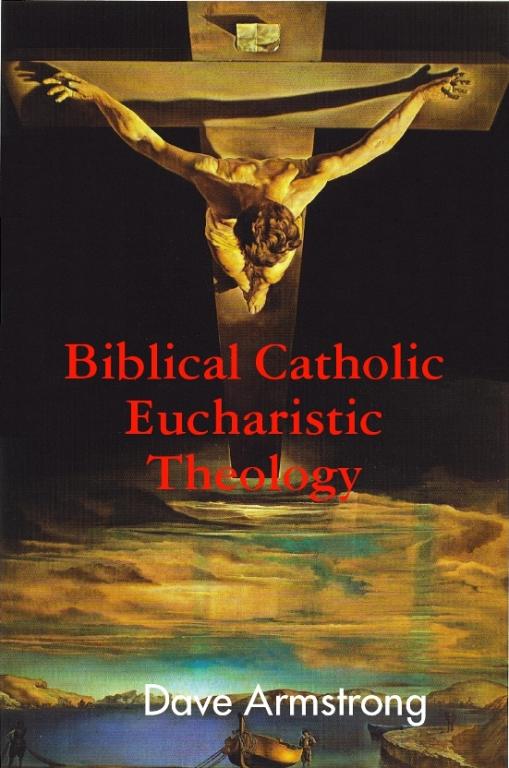vs. James Swan
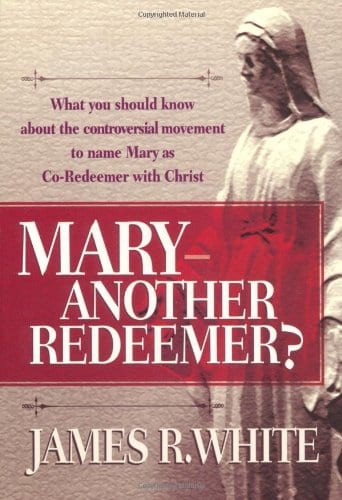
I joined William Possidento, the primary author, in a critique of James White’s book above. Protestant Reformed anti-Catholic polemicist James Swan then offered criticisms of our critique. His words will be in blue.; words of James White in green.
***
[originally posted on 3-15-04 and 9-7-05]
***
You assert that Irenaeus believed Mary to be co-redemptrix? (that is, you via “William Possidento”).
In a primitive, relatively undeveloped sense, yes. This was seen in his words, “Mary was the only one to cooperate in the economy” and in the general idea of Mary as the New Eve or Second Eve. Elsewhere (Mary Mediatrix: Patristic, Medieval, & Early Orthodox Evidence). St. Irenaeus (130-202), in his famous Against Heresies (bet. 180-199) wrote:
[S]o also Mary . . . being obedient, was made the cause of salvation for herself and for the whole human race . . . Thus, the knot of Eve’s disobedience was loosed by the obedience of Mary. What the virgin Eve had bound in unbelief, the Virgin Mary loosed through faith.” (3,22,4; from Jurgens, W.A., The Faith of the Early Fathers, Collegeville, Minnesota: Liturgical Press, 1970, vol. 1, p. 93, #224)
[F]or in no other way can that which is tied be untied unless the very windings of the knot are gone through in reverse: so that the first joints are loosed through the second, and the second in turn free the first . . . Thus, then, the knot of the disobedience of Eve was untied through the obedience of Mary.” (Against Heresies, III, 22,4; from Most, William G., Mary in Our Life, Garden City, New York: Doubleday Image, 1954, 25)
William Most comments:
Mary, says St. Irenaeus, undoes the work of Eve. Now it was not just in a remote way that Eve had been involved in original sin: she shared in the very ruinous act itself. Similarly, it would seem, Mary ought to share in the very act by which the knot is untied — that is, in Calvary itself. (in Most, ibid., 25)
Just as the human race was bound over to death through a virgin, so was it saved through a virgin: the scale was balanced — a virgin’s disobedience by a virgin’s obedience. (Against Heresies, V, 19, 1; cited in Most, ibid., 274)
Swan acts as if this is extraordinary special pleading to see in remarks such as these a kernel of the notion of mediatrix or the always vastly-misunderstood term, “co-redemptrix”. Funny, then, that the well-known Protestant patristics scholar J. N. D. Kelly doesn’t think so (he precisely agrees with me):
The real contribution of these early centuries, however, was more positively theological, and consisted in representing Mary as the antithesis of Eve and drawing out the implications of this. Justin was the pioneer, although the way he introduced the theme suggests that he was not innovating . . . Tertullian and Irenaeus were quick to develop these ideas. The latter, in particular, argued [Against Heresies, 3, 22, 4; cf. 5, 19, 1] that Eve, while still a virgin, had proved disobedient and so became the cause of death both for herself and for all mankind, but Mary, also a virgin, obeyed and became the cause of salvation both for herself and for all mankind. “Thus, as the human race was bound fast to death through a virgin, so through a virgin it was saved.” Irenaeus further hinted both at her universal motherhood and at her cooperation in Christ’s saving work, describing [Ibid, 4, 33, 1] her womb as “that pure womb which regenerates men to God.” (Early Christian Doctrines, San Francisco: HarperCollins, revised edition of 1978, 493-494, emphases added)
So we see that William Possidento and myself were merely citing most of the same passages that Kelly cites, and interpreting them in precisely the same way. Even Mr. White is not a Church historian, so if it comes down to a conflict of historical fact between White and Kelly, it is obvious who has the advantage and who can be trusted for the facts. And that is not all one can find by way of Protestant historians. How about Philip Schaff? He writes:
The development of the orthodox Mariology and Mariolatry originated as early as the second century in an allegorical interpretation of the history of the fall, and in the assumption of an antithetic relation of Eve and Mary, according to which the mother of Christ occupies the same position in the history of redemption as the wife of Adam in the history of sin and death [Rom 5:12 ff., 1 Cor 15:22] . . . Justin Martyr, Irenaeus, and Tertullian, are the first who present Mary as the counterpart of Eve, as a “mother of all living” in the higher, spiritual sense, and teach that she became through her obedience the mediate or instrumental cause of the blessings of redemption to the human race, as Eve by her disobedience was the fountain of sin and death. [Footnote: “Even St. Augustine carries this parallel between the first and second Eve as far as any of the fathers . . . “] (History of the Christian Church, Vol. III: Nicene and Post-Nicene Christianity: A.D. 311-600, Grand Rapids, Michigan: Eerdmans Pub. Co., 1974; reproduction of fifth edition of 1910, 414-415, emphases added. This work is available in its entirety online, too)
But James White makes the following profoundly ignorant historical summation, that James Swan cited from the original paper:
James White did not bring most of these ECF’s [early Church Fathers] up. DA has, in order to disprove White’s assertion that “the idea of Mary as Coredemptrix or Mediatrix completely absent from the Bible and from the early Church, it does not have its origin in history but in this kind of piety or religious devotion that is focused upon Mary.” [pp. 75-76 of White’s book]
This being the case, I have the utmost sympathy and compassion for James Swan in his effort to defend such a ridiculously wrongheaded point of view. The old wise proverb says that “you can’t make a silk purse out of a sow’s ear,” but maybe Swan can somehow pretend that these notions were absent from history, per White, when they clearly were not, according to Protestant historians Kelly and Schaff (two of the very best and most-cited, at that). Best wishes! I don’t envy you. And I think we can already see one reason why Mr. White won’t come out from behind his word-processor and defend his own historical absurdities from his book.
Furthermore, Lutheran historian Jaroslav Pelikan (who converted to Orthodoxy after the following was written), observed the true focus of patristic and Catholic Mariology, during St. Irenaeus’ time:
[A]s Christian piety and reflection sought to probe the deeper meaning of salvation, the parallel between Christ and Adam found its counterpart in the picture of Mary as the Second Eve . . . in is fundamental motifs the development of the Christian picture of Mary and the eventual emergence of a Christian doctrine of Mary must be seen in the context of the development of devotion to Christ and, of course, of the development of the doctrine of Christ.
For it mattered a great deal for christology whether or not one had the right to call Mary Theotokos [Mother of God] . . . an apt formula for their belief that in the incarnation deity and humanity were united so closely . . . It was a way of speaking about Christ at least as much as a way of speaking about Mary. (The Christian Tradition: A History of the Development of Doctrine, Vol. I: The Emergence of the Catholic Tradition (100-600), University of Chicago Press, 1971, 242-243)
Questions:
1. Which line from Irenaeus above actually says this?
The concept (in early development) was there, as seen in the quotes themselves and in the summary of Irenaeus’ teaching by Kelly and Schaff, where they actually relate it to “redemption” and “salvation” and use words like “mediate” and “instrumental” with regard to Mary’s place in the economy of redemption. The word no more has to be present than the word “Trinity” has to be in the Bible, in order to think that the teaching is there.
2. I direct your attention to Giovanni Miegge’s explanation of the passage from Irenaeus in question:
If we pass from the New Testament to the patristic field there is equal silence. Irenaeus’ famous parallel of Eve and Mary alludes only to the motherhood of Mary who gives the Redeemer to the world with her faith in the divine annunciation. The title “advocate” refers to the restoration of Eve and could be extended at most to the idea of a ministry of intercession which, however, is not explicitly contained in the term. All those who in various ways look for this parallel in the first century connect it with Mary’s motherhood. Mary is not associated with the redemptive sufferings of Christ: ‘if anyone is it is the martyrs, but in a quite indirect form as imitators of Christ, as members of His body, as witnesses of Him. In that sense the apostle Paul speaks of his part in the sufferings of Christ, with an ardent figure of speech, “to fill up that which is lacking of the afflictions of Christ” (Colossians 1 : 24, R.V.); but he attributes no co-redemptive significance to this thought. But Mary did not know martyrdom.
Source: Giovanni Miegge, The Virgin Mary (Philadelphia: Westminster Press, 1955), 163-164)
That does not agree with Kelly, Schaff, and Pelikan, and (frankly) they carry a lot more weight than Miegge does. Why don’t you tell us more about him? What are his credentials?
3. Where does Jaroslav Pelikan say that Irenaeus believed Mary was co-[re]demptrix?
It is implicit in the concept of Second Eve, by its very nature, as shown above.
I couldn’t find it in the quote from your paper.
That’s because you are looking for a word, rather than a concept.
Is your use of Pelican [sic] simply arguing for development of doctrine,
It’s not just development (though that is a crucial component of this discussion), but the fact that the concept of New Eve was already in full force at this early stage (as early as Justin Martyr, who died in 165 — and Kelly says it looks like he was just passing on what he received).
. . . in which case, the reader has to accept the faith claim of the “acorn and the oak tree”? If this is so, your critique of James White should spell this out clearly, with a statement like this: “Dave Armstrong’s interpretation of the history of Mariology demands the Roman Catholic notion of development of doctrine. Without this, James White’s book, Mary Another Redeemer makes historical sense.”
It’s not necessary to have a “Roman Catholic notion of development of doctrine” in order to accept this development, but to have whatever kind of development Schaff and Pelikan and Kelly accept (since they are not Catholics). This is the whole point. It’s not a “Catholic thing”; it is an “historical thing.” Schaff detests the very doctrines he is describing, and makes no bones about it, but he is also (invariably) an honest historian who presents the facts — whatever he thinks of them.
White detests the doctrines, too, but then tries to vainly pretend that they were absent from patristic history. This is the difference, and this is one of a multitude of reasons why I have long maintained that White is a sophist and special pleader.
In my portion of the book review I made elaborate and involved arguments showing that White himself accepts development in one area but denies it in another, and his criteria for doing so are completely arbitrary, self-contradictory, and instances of glaring double standards. So this has already been thoroughly dealt with.
Development of Mariology is no different than development of any other doctrine. One may quibble with it because it is supposedly so “unbiblical,” but then one would have to also toss out the canon of Scripture, which is absolutely unbiblical. Etc. I’ve made all the arguments.
*****
As far as I am concerned, so far, not one thing I have contended has been overthrown or refuted. It was claimed (by White and his defenders) that St. Irenaeus taught not a thing about Mary Mediatrix. I responded with Protestant historians Kelly and Schaff (and a bit indirectly), Pelikan, who thought quite otherwise. It was claimed that I was demanding people to accept a presupposed Catholic version of development of doctrine. I showed how that was not the case, and my extensive reasoning for why I think that, in the review itself, needs to be dealt with. So we don’t have much substance so far. Let’s see how much can be produced . . .
I would like to work through all of DA’s Irenaeus quotes, slowly, as time allows.
It would be nice if you would counter-respond to my first lengthy response, since I raised, I think, several important issues that you need to deal with for your case to succeed. I cited three very reputable Protestant historians. But I guess that would be too much like a dialogue . . . I’ll take what I can get. But I will always note that you left something unresponded-to, so readers don’t miss that “detail.”
I would like to look first at this comment from DA’s paper:
St. Irenaeus wrote, for example, of Christ as the pure one opening purely that pure womb which regenerates men unto God (Against Heresies IV,33,11) – words with which Irenaeus credited the Virgin’s womb and assigns to her a universal motherhood. Writing of the economy, that is, the plan of salvation, St. Irenaeus remarked ..without Joseph’s action, Mary was the only one to cooperate in the economy… (Against Heresies III, 21,5, in Miravalle, p. 178). Contemplate that. St. Irenaeus gave, with those words, a second century statement of belief that Mary had a unique role in the plan of salvation.
DA’s comments about Irenaeus
Actually, William Possidento’s at this point (just to clarify). My arguments in the review were mostly analogical ones dealing mostly with development of doctrine, whereas his were textual ones from the Fathers and James White’s own book.
overlook something rather important: the context in which they were written.
Context does not nullify our points at all (as I will show). You only think it does when you apply the typically Reformed “either/or” dichotomous mindset to the passage in order to maintain that one must be doing only one thing and could not possibly be doing more than one (killing two birds with one stone).
Note above, the book written by Irenaeus is called Against Heresies. The intent of Irenaeus was not to write a Bible dictionary, so when he got to the letter “M” he wrote out his thoughts on Mary. Hardly.
In fighting heresy, one may express points of Mariology, just as he might express various aspects of christology, soteriology, anthropology, theology proper, etc. It doesn’t take a rocket scientist to figure that out. If you are fighting heretical theology, you have to give orthodox theology to counter it (in fact, fighting error is often the occasion for some of the most elaborate expositions of orthodox theology, as a counterpoint; for example, St. Augustine’s reactions to the Manichees and Donatists and Pelagians).
And if Mary is mentioned in any “theological” way, that is Mariology, pure and simple. It may be very primitive and undeveloped (of course it is, in the second century (Irenaeus’ era), though it is remarkably and surprisingly well-developed, given Protestant hostile assumptions about how little it should be by this time), but it remains Mariology because it offers some theology and interpretation of Mary.
Against Heresies is concerned with, you guessed it, heresy.
Very good; a refreshing note of agreement . . .
As Giovanni Miegge explains,
The gnostic teachers in the imposing cycle of their cosmogony brought in the Saviour Jesus at a certain point, one who came down into the material world to free the souls that had fallen. But, spiritualists to excess, they maintained that the purest “eon” could not really have incarnated himself in a man. They thought that the Christ had temporarily united himself to the man Jesus from his baptism to the crucifixion only, or that he manifested himself with a seeming body without true material substance (docetism, from dokei, seems). This second conception had the advantage also of not requiring a real maternity in the physical sense on the part of Mary, whom the eon Christ simply passed through as water passes through a conduit. The virginity of Mary in the bringing forth was the legitimate consequence of these speculations, although it was not one in the strict sense.
The Church reacted decisively to the gnostic docetism that denied the real humanity of the Lord and transferred salvation to a mythical plane away from the historical and human. The traces of this reaction are plain to be seen, first in the later writings of the New Testament, then through the references and confutations of the anti-heretical writers, and also in the elaboration of the oldest symbols of the faith.” The so-called Apostles’ Creed has an anti-docetic tone that is quite recognizable in the emphasis of its affirmation of the real humanity of the Lord and His historical life, “Begotten {gennethenta) by the Holy Spirit and by Mary”, “qui natus est de Spiritu Sancto et Maria Virgine“, as the Roman Apostles’ Creed affirms. Or “conceived by the Holy Spirit, born of the Virgin Mary”, “conceptum de Spiritu Sancto, natum ex Maria Virgine“, according to the more accurate rendering of the definitive Gallican wording. The Creed expresses the same insistence on the humanity and historicity of Christ in its particularizing of the Passion: “suffered under Pontius Pilate, was crucified dead and buried”.The Church did it directly again with the stress these expressions receive from Ignatius of Antioch: “Jesus Christ of the progeny of David by Mary, who was truly begotten, ate and drank, was truly persecuted under Pontius Pilate, was truly crucified and died, in the presence of beings celestial, terrestrial and subterrestrial, who was truly brought to life from the dead, His Father raising Him up.” Mary and Pilate! The two pillars on which stands the affirmation of the real historicity of Christ, truly born in a human body at a definite point in history, and truly crucified in that body at an equally definite point in time. Mary and Pilate, the two witnesses of the humanity of the Saviour, that is of the reality of the incarnation. Mary owes her inclusion in the Creed—as does Pilate—to this her function of witnessing, but she assumes, besides, the other function of testifying to His divinity by the adjective that describes her, the Virgin Mary. This function she shares with the affirmation of the resurrection and ascension of Christ which ends the central article of the Creed, Vere homo et vere Deus, according to the concise formula of Irenaeus.
Source: Giovanni Miegge, The Virgin Mary (Philadelphia: Westminster Press, 1955), 36-37.
Yes, of course. I have no problem with this. Catholics have always stated that Mariology is christocentric, and that this was its primary purpose. It was to safeguard the deity and incarnation of Jesus. You guys are the ones who try to make out that we are somehow separating Mary from her Son Jesus, as some sort of ridiculous rival “goddess.” So now we have to be accused of the caricature that you try to make out is our belief, that we always deny, and you see this as some “debating point”? :-)
This is precisely why I cited Jaroslav Pelikan, in agreement with Catholic theology and perspective: “. . . in its fundamental motifs the development of the Christian picture of Mary and the eventual emergence of a Christian doctrine of Mary must be seen in the context of the development of devotion to Christ and, of course, of the development of the doctrine of Christ.”
But somehow you miss that “detail” because (apparently) you are so uninterested in my first response that you repeat things already dealt with in it, and agreed to. Weird . . . but this is common in the Protestant response to Catholic apologetics. It’s almost as if we are talking but the words don’t register. Many times in debates like this, I find myself repeating the argument I just made, because my opponent acts as if I never made it, in the very structure and thrust of his “response.” It’s very frustrating, and a bit insulting, I must say. In effect, you are forcing us to “believe” only what you want us to believe (i.e., the polemical caricature of “Catholicism”), no matter what we say; no matter how many times we clarify, till we’re blue in the face. Even when we fully agree with you, you don’t want to believe it.
So, the statements about Mary found in Irenaeus are not intended to present the “kernel” of the non-defined “co-mediatrix” dogma, but are rather intended to safeguard correct doctrine about Jesus Christ.
The negation you assert doesn’t follow, and is illogical. First of all, you haven’t proven that to argue about Christ necessarily excludes discussion of Mary, as if the two are like oil and water or two magnetic poles. In fact, the long citation you just provided puts the lie to this. Mariology was (and is) a subset of christology. This is how Irenaeus approaches it, and how the Catholic Church does, as well.
Secondly, when people are presenting a primitive, undeveloped form of a doctrine, they don’t themselves know how far it will be developed in the future, by definition. If they did, there would be no development! But there is development, of every doctrine. The canon of Scripture developed; so did original sin, and the Hypostatic Union, and trinitarianism, and the doctrine of the Holy Spirit, and Mariology, and sacramentology, and the doctrine of the atonement, and eucharistic theology. Irenaeus would have been incapable of presenting, for example, the full intricate doctrine of the Hypostatic Union, which was fully developed at the Council of Chalcedon in 451.
So basically, you have argued nothing whatsoever in your last statement. That’s all it is: a bald statement. You state what you assume. This is not argument. It is an assumption. To the extent that you think it is an argument, it is merely logically circular. But you have some more reasoning to go, so I will desist.
The quote offered by DA:
St. Irenaeus wrote, for example, of Christ as the pure one opening purely that pure womb which regenerates men unto God (Against Heresies IV,33,11) – words with which Irenaeus credited the Virgin’s womb and assigns to her a universal motherhood.
First of all, this is not just Catholic “special pleading” and “anachronistically reading our ‘papist’ views back into the 2nd century. Here we go repeating the argument we already gave, again, because you have ignored it and act as if it never happened (the only good thing about that is that repetition is a helpful learning tool). I cited J. N. D. Kelly arriving at the same exact same conclusion about this very passage: “Irenaeus further hinted both at her universal motherhood and at her cooperation in Christ’s saving work, describing her womb as ‘that pure womb which regenerates men to God.'”
So how is it that I am somehow the unreasonable one even though I can cite one of the leading Protestant patristic experts in exact agreement with my interpretation of Irenaeus, while you are reasonable when you ignore that and keep citing this Miegge — whom you won’t tell us a thing about (per my request)? Do you actually believe that Miegge is a better scholar than Kelly and Schaff, and to be believed over them in the event that they disagree? If so, why? But I don’t expect you to answer this, since you ignored my entire first reply. This gets old. But I’ll pray for patience and keep refuting what you write as long as I can stand your utter ignoring of my arguments.
Schaff (repeat, REPEAT) also asserts a “universal motherhood” as an early patristic belief:
Justin Martyr, Irenaeus, and Tertullian, are the first who present Mary as the counterpart of Eve, as a ‘mother of all living’ in the higher, spiritual sense, and teach that she became through her obedience the mediate or instrumental cause of the blessings of redemption to the human race, . . .
Now, lets look at IV, 33, 11, in its context:
Sure, let’s. And I show you the courtesy of actually replying to your arguments. That’s kind of nice, isn’t it?
11. For some of them, beholding Him in glory, saw His glorious life (conversationem) at the Father’s right hand;(3) others beheld Him coming on the clouds as the Son of man;(4) and those who declared regarding Him, “They shall look on Him whom they have pierced,”(5) indicated His (second) advent, concerning which He Himself says, “Thinkest thou that when the Son of man cometh, He shall find faith on the earth?”(6) Paul also refers to this event when he says, “If, however, it is a righteous thing with God to recompense tribulation to them that trouble you, and to you that are troubled rest with us, at the revelation of the Lord Jesus from heaven, with His mighty angels, and in a flame of fire.”(7) Others again, speaking of Him as a judge, and , as if it were a burning furnace, (to) the day of the Lord, who “gathers the wheat into His barn, but will burn up the chaff with unquenchable fire,”(8) were accustomed to threaten those who were unbelieving, concerning whom also the Lord Himself declares, “Depart from me, ye cursed, into everlasting fire, which my Father has prepared for the devil and his angels.”(9) And the apostle in like manner says (of them), “Who shall be punished with everlasting death from the face of the Lord, and from the glory of His power, when He shall come to be glorified in His saints, and to be admired in those who believe in Him.”(10) There are also some (of them) who declare, “Thou art fairer than the children of men;”(11) and, “God, Thy God, hath anointed Thee with the oil of gladness above Thy fellows;”(12) and, “Gird Thy sword upon Thy thigh, O Most Mighty, with Thy beauty and Thy fairness, and go forward and proceed prosperously; and rule Thou because of truth, and meekness, and righteousness.”(13) And whatever other things of a like nature are spoken regarding Him, these indicated that beauty and splendour which exist in His kingdom, along with the transcendent and pre-eminent exaltation (belonging) to all who are under His sway, that those who hear might desire to be found there, doing such things as are pleasing to God. Again, there are those who say, “He is a man, and who shall know him?”(14) and, “I came unto the prophetess, and she bare a son, and His name is called Wonderful, Counsellor, the Mighty God;”(15) and those (of them) who proclaimed Him as Immanuel, of the Virgin, exhibited the union of the Word of God with His own workmanship, (declaring) that the Word should become flesh, and the Son of God the Son of man (the pure One opening purely that pure womb which regenerates men unto God, and which He Himself made pure); and having become this which we also are, He (nevertheless) is the Mighty God, and possesses a generation which cannot be declared. And there are also some of them who say, “The Lord hath spoken in Zion, and uttered His voice from Jerusalem;”(16) and, “In Judah is God known;”(17)—these indicated His advent which took place in Judea. Those, again, who declare that “God comes from the south, and from a mountain thick with foliage,”(18) announced His advent at Bethlehem, as I have pointed out in the preceding book.(19) From that place, also, He who rules, and who feeds the people of His Father, has come. Those, again, who declare that at His coming “the lame man shall leap as an hart, and the tongue of the dumb shall (speak) plainly, and the eyes of the blind shall be opened, and the ears of the deaf shall hear,”(1) and that “the hands which hang down, and the feeble knees, shall be strengthened,”(2) and that “the dead which are in the grave shall arise,”(3) and that He Himself” shall take our weaknesses, and bear our sorrows,”(4)—(all these) proclaimed those works of healing which were accomplished by Him.
Now is Irenaeus “assigning to Mary a universal motherhood”?
According to Kelly and Schaff, he is. Why do they think that? Because of an incorrigible “papal propagandistic” bias?
and expressing Mary’s role in suffering with Christ as Coredemptrix? No.
That’s a later development, and I agree that it is improper to read into Irenaeus’ statements.
Irenaeus is protecting Christian doctrine against heretics.
That’s right, but no one is arguing that he isn’t. How does that preclude this particular interpretation of his words about Mary?
DA further offers:
Writing of the economy, that is, the plan of salvation, St. Irenaeus remarked ..without Joseph’s action, Mary was the only one to cooperate in the economy… (Against Heresies III, 21,5, in Miravalle, p. 178). Contemplate that. St. Irenaeus gave, with those words, a second century statement of belief that Mary had a unique role in the plan of salvation.
Yes, indeed, let’s contemplate it. Here is III, 21, 5:
5. And when He says, “Hear, O house of David,”(9) He performed the part of one indicating that He whom God promised David that He would raise up from the fruit of his belly (ventris) an eternal King, is the same who was born of the Virgin, herself of the lineage of David. For on this account also, He promised that the King should be “of the fruit of his belly,” which was the appropriate (term to use with respect) to a virgin conceiving, and not “of the fruit of his loins,” nor “of the fruit of his reins,” which expression is appropriate to a generating man, and a woman conceiving by a man. In this promise, therefore, the Scripture excluded all virile influence; yet it certainly is not mentioned that He who was born was not from the will of man. But it has fixed and established “the fruit of the belly,” that it might declare the generation of Him who should be (born) from the Virgin, as Elisabeth testified when filled with the Holy Ghost, saying to Mary, “Blessed art thou among women, and blessed is the fruit of thy belly;”(1) the Holy Ghost pointing out to those willing to hear, that the promise which God had made, of raising up a King from the fruit of (David’s) belly, was fulfilled in the birth from the Virgin, that is, from Mary. Let those, therefore, who alter the passage of Isaiah thus, “Behold, a young woman shall conceive,” and who will have Him to be Joseph’s son, also alter the form of the promise which was given to David, when God promised him to raise up, from the fruit of his belly, the horn of Christ the King. But they did not understand, otherwise they would have presumed to alter even this passage also.
As DA’s paper admonishes to “contemplate” that “ Mary was the only one to cooperate in the economy” , I can’t quite see where I’m supposed to find the seed of co-redemption in the above quote. I’d rather simply read what Irenaeus said, and agree with this ancient author that Christ was not the biological son of Joseph.
The passage is actually from III, 21, 7, as Miravelle indicated in his notes. Here is the whole passage (emphasis added):
7. On this account also, Daniel, foreseeing His advent, said that a stone, cut out without hands, came into this world. For this is what “without hands” means, that His coming into this world was not by the operation of human hands, that is, of those men who are accustomed to stone-cutting; that is, Joseph taking no part with regard to it, but Mary alone co-operating with the pre-arranged plan. For this stone from the earth derives existence from both the power and the wisdom of God. Wherefore also Isaiah says: “Thus saith the Lord, Behold, I deposit in the foundations of Zion a stone, precious, elect, the chief, the corner-one, to be had in honour.” So, then, we understand that His advent in human nature was not by the will of a man, but by the will of God.
Miravalle gives the Latin of the relevant phrase: sola Maria cooperante dispositioni.
Beware of reading history with the glasses of modern Roman Catholic Mariology.
Again (for the tenth) time, it is not just “Catholic-tinted glasses” but the informed historical opinions of Kelly and Schaff. James White claims that mediation and co-redemption are “completely absent” from “the early Church.” But Kelly, writing about Irenaeus’ Mariology, uses descriptive words like “cause of salvation,” “through a virgin it was saved,” “universal motherhood,” “cooperation in Christ’s saving work,” and “[her womb] regenerates men.” Schaff uses words like “The development of the orthodox Mariology and Mariolatry originated as early as the second century,” “redemption,” ‘mother of all living’,” and “mediate or instrumental cause of the blessings of redemption to the human race.” What more does one need?
Furthermore, a few centuries later, these concepts became extremely explicit in some of the Fathers (precisely as we would expect from the nature of development itself). So. for example, St. Ambrose of Milan (c. 339-397) wrote:
Mary was alone when the Holy Spirit came upon her and overshadowed her. She was alone when she saved the world — operata est mundi salutem – and when she conceived the redemption of all — concepit redemptionem universorum. (in Miravelle, Mark I., editor, Mary: Coredemptrix, Mediatrix, Advocate: Theological Foundations, Santa Barbara: Queenship Publishing, 1995, p. 14; from Epist. 49,2; ML 16, 1154)
And:
She engendered redemption for humanity, she was carrying, in her womb, the remission of sins. (in Miravelle, ibid., p. 14; from De Mysteriis III, 13; ML 16,393; De instit. Virginis 13,81; ML 16,325)
St. Ephraem of Syria (c. 306-373) called Mary the “dispensatrix of all goods.” (in William G. Most, Mary in Our Life, Garden City, New York: Doubleday Image, 1963, 48)
Basil of Seleucia (died c. 458) referred to her as the “Mediatrix of God and men.” (in Most, ibid., 48)
St. Cyril of Alexandria (d. 444) wrote:
Hail, Mary, Mother of God, by whom all faithful souls are saved [sozetai]. (in Miravelle, ibid., p. 13; from MG 77,992, and 1033; from the Council of Ephesus in 431)
The expression Mediatrix or Mediatress was found in two 5th-century eastern writers, Basil of Seleucia (In SS. Deiparae Annuntiationem, PG 85, 444AB) and Antipater of Bostra (In S. Joannem Bapt., PG 85 1772C. The theory developed in the work of John of Damascus (d.c. 749; see Homilia I in Dormitionem, PG 96 713A) and Germanus, Patriarch of Constantinople (d.c.733; see Homilia II in Dormitionem, PG 98 321, 352-353). [see Miravelle, ibid., 134-135]
The Protestant reference Oxford Dictionary of the Christian Church (ed. F. L. Cross, 2nd edirtion, Oxford Univ. Press, 1983, p. 561), states concerning Patriarch Germanus:
Mary’s incomparable purity, foreshadowing the doctrine of the Immaculate Conception, and her universal mediation in the distribution of supernatural blessings, are his two frequently recurring themes.
St. Andrew of Crete (c. 660-740) referred to Mary as the “Mediatrix of the law and grace” and also stated that “she is the mediation between the sublimity of God and the abjection of the flesh.” (Nativ. Mariæ, Serm. 1 and Serm. 4, PG 97, 808, 865; in Miravelle, ibid., 283)
St. John of Damascus (c. 675-c. 749) spoke of Mary fulfilling the “office of Mediatrix.” (Hom. S. Mariæ in Zonam, PG 98, 377; in Miravelle, ibid., 283)
But remember, James White has informed us on pp. 75-76 and 137 of his book:
In fact, not only is the idea of Mary as Coredemptrix or Mediatrix completely absent from the Bible and from the early Church, it does not have its origin in history but in this kind of piety or religious devotion that is focused upon Mary.
[T]he push to define Mary as Coredemptrix flows out of the piety seen so plainly in Alphonsus Ligouri [sic] and Louis Marie Grignon de Montfort. It does not come to us from Scripture, nor does it come from history.
White consistently misspells Liguori as “Ligouri”. That saint lived from 1696-1787. White appears to date this theological development to him, but he is more than 1200 years off the mark, since, as shown, the very terms mediatrix or mediatress were being used in the 5th century by at least two writers, and the concept in kernel can be traced as far back as Justin Martyr, Tertullian, and Irenaeus. So much for Mr. White’s historiographical abilities . . . they are almost as deficient as his theological methodologies and conclusions.
Of course, he might want to argue that the 5th century (when St. Augustine and St. Jerome and St. Cyril of Alexandria lived) was not the time of the “early Church.” It wouldn’t be the oddest thing he has argued.
Contrarily, Read the Ancient Church Fathers in their contexts. I assume that anyone looking for Mary in the Roman Catholic sense will find any statement about Mary in ancient church history and find some way to apply it to their own paradigm.
You are merely assuming what you are trying to prove, by offering either no arguments at all, or circular ones (as I think I have shown).
Which leads me to ask the question: Does a Roman Catholic need an infallible interpreter to interpret history also? It seems they do.
No, we only need good, competent Protestant historians like Kelly and Schaff. But we need to avoid amateur historians like James White (and James Swan) who are clearly in over their head when trying to discuss early Mariology. I’m no historian, either, but it is very easy for me to find substantiation from the best Protestant historians of Church history and the history of doctrine, for my point of view.
I suggest as a friend that you give up this fight, before you dig yourself deeper into self-contradiction and futile opposition to plain historical facts. Let James White defend himself! Why should you have to take the fall for him?
James Swan further responds (on the CARM board):
I posted the following quote from Giovanni Miegge giving an explanation of the passage from Irenaeus put forth by Dave Armstrong:
If we pass from the New Testament to the patristic field there is equal silence. Irenaeus’ famous parallel of Eve and Mary alludes only to the motherhood of Mary who gives the Redeemer to the world with her faith in the divine annunciation. The title “advocate” refers to the restoration of Eve and could be extended at most to the idea of a ministry of intercession which, however, is not explicitly contained in the term. All those who in various ways look for this parallel in the first century connect it with Mary’s motherhood. Mary is not associated with the redemptive sufferings of Christ: ‘if anyone is it is the martyrs, but in a quite indirect form as imitators of Christ, as members of His body, as witnesses of Him. In that sense the apostle Paul speaks of his part in the sufferings of Christ, with an ardent figure of speech, “to fill up that which is lacking of the afflictions of Christ” (Colossians 1 : 24, R.V.); but he attributes no co-redemptive significance to this thought. But Mary did not know martyrdom.
Source: Giovanni Miegge, The Virgin Mary (Philadelphia: Westminster Press, 1955), 163-164)
It should be pointed out that Dave simply dismissed the quote rather than interact with the quote. It’s the old, “my scholar is better than your scholar” technique, of which I can also be guilty of utilizing at times. The technique is useful since it dismisses the content of the quote without ever interacting with the content of the quote.
This is not an accurate description of what I did, and I’ll explain why. First of all, roughly the second half of Miegge’s citation has nothing to do with Irenaeus in the first place, and his Mariology was the subject at hand, and so that portion can be dismissed for the time being.
Secondly, no argument that I can see is presented here, with regard to Irenaeus; there are only bald declarative statements:
“[in the] patristic field there is equal silence . . . ”
[this is, of course, demonstrably untrue, just as White’s summary of supposed patristic silence or “absence” is]
“Irenaeus’ famous parallel of Eve and Mary alludes only to . . . ”
“The title ‘advocate’ refers to . . . ”
“Mary is not associated with the redemptive sufferings of Christ:”
These are not arguments, but mere statements. There is a difference.
Thirdly, this being the case, it becomes basically an appeal to authority on both our parts. We’re all reading the same texts and drawing conclusions from them: the professionals (Miegge, Schaff, Kelly, and Pelikan) and the amateurs (me and you). Professionals hold more weight in these matters than amateurs do, because they are familiar with the whole body of a Church Father’s work, and with his thought, just as a Bible scholar can interpret the Bible with much more knowledge because they know much more about background, language, culture, exegesis, hermeneutics, etc.
Fourthly, if it is simply one scholars’ word against the other, I stand by my opinion that Kelly and Schaff are more to be trusted than Miegge. How does the layman decide when there are differences of opinions among scholars? In this case, I am citing all Protestant scholars, rather than Catholic partisans who already agree with me (as a foregone conclusion).
And I am citing some of the most well-known and reputable historians of Christian doctrine. I need not argue that. I don’t believe you would deny it. You, on the other hand, cite a relatively unknown scholar, who looks to be an anti-Catholic and a fellow Reformed. You’re citing your own guy. This carries less weight in disputes such as this, because you are obviously biased towards the person in your own camp (just as I am, and everyone is), and will tend to agree with most (if not everything) of what he says.
Schaff speaks of “Mariolatry” too, but he doesn’t deny that these ideas were present in Irenaeus (unlike Miegge and White). That is the difference. At best, you can only establish that either of our positions are equally tenable, based on which historian we go with. But Miegge’s and White’s assertions about “absence” and “silence” in the Fathers on these issues are able to be demonstrated as false, and I have already done so. That is something solid and factual to refute (it’s falsifiable), and since they have been shown to be in error on the facts, their judgment in matters of interpretation is not quite so credible as it was before we exposed their serious errors of fact.
You say that I dismissed the quote. I did insofar as no argument was presented in it. If he gives no argument, I am not obliged to refute what he says. In fact, I cannot, because there is nothing to refute if no argument from the texts is presented. He gives his dogmatic interpretation. I simply said that Kelly and Schaff disagree with his interpretation and that they carry more weight. As a layman, I yield to their judgment. And I can’t be accused of simply “choosing my own guy” because none of them are Catholics. You choose your one guy, though (and no one else thus far) and that doesn’t strike one as particularly “objective.”
Dave then asked, “Why don’t you tell us more about him? What are his credentials?”
Giovanni Miegge, was Professor of Church History in the Waldensian Faculty of Theology at Rome. He published a book on Rudolf Bultmann for which he is better known for.
Thank you. With all due respect to you and Dr. Miegge, this hardly puts him in league with giants in the field like Kelly, Pelikan, and Schaff. I look in vain to try to find this guy in any bibliographies of Mariological works (neither Pelikan nor Kelly list him, nor does Protestant Max Thurian, in his book on Mary). Can you give me any bibliographies that he is listed in? If you type his name in at Google, you find very little (at least not in English).
Therefore, it’s not a case of “my professor’s better than yers; nya nya nya nya naaaaa nya,” but a clear-cut case of some of the most eminent and widely cited Church historians vs. a relatively unknown one. So it is quite reasonable to side with the former in cases of disagreement.
Is this all you can come up with? You’ll simply keep quoting Miegge as if he is the last word on the subject, and blithely dismiss the fact that three major Protestant historians agree with my position almost exactly?
You haven’t acknowledged that all these things developed. To me it is self-evident. One cannot believe otherwise. It is simply the history of doctrine.
Is the following part of “primitive, undeveloped form of a doctrine” found in Irenaeus?
In his book titled, Irenaeus of Lyons, Grant wrote:
In Irenaeus’ judgment the Ephesian church, founded by Paul and preserved by John, is a reliable witness to the tradition of the apostles (Against Heresies, 3.3.4) though his exegesis of John 8:57 (“you are not yet 50 years old”) leaves much to be desired. He is convinced that Luke cannot have meant to say that Jesus was baptized in his thirtieth year, because unless he reached “the most necessary and honorable period of his life” he could not have had disciples. John certifies that he was over 40 but under 50. “All the presbyters of Asia who were with John the Lord’s disciple testify that John delivered the same tradition to them, for he remained with them until the reign of Trajan” (Against Heresies, 2.22.4-5). Irenaeus’ doctrine of recapitulation assured him that in order to save men of all ages Jesus had to “recapitulate” the life of humanity and pass in five stages from infant to child to adolescent to manhood and finally advanced age. His analysis of ages is like what we find in Hippocrates, for whom each of the ages mentioned by Irenaeus occupies some multiple of seven years. One is a child from 1 to the loss of teeth at 7, a boy to puberty at 14, a lad till the trace of a beard comes at 21, a young man until the whole body is grown at 28, then a man from 29 to 49; an elderly man lasts only until 56, and after that becomes an old man. Jesus could not have become really mature before reaching 49. Since Irenaeus explicitly dated the birth of Jesus around the forty-first year of Augustus, he cannot have had in mind the real beginning of that emperor’s reign in January 27 BC, but must have backdated it to the death of Julius Caesar in 44. If then Jesus was born in about 3 BC he would have reached 49 during the reign of Claudius (41-54), and that is where Irenaeus set his death in his later Demonstration.
See Robert M. Grant, Irenaeus of Lyons (London: Routledge, 1997), p. 33.
He was clearly wrong in this respect, so no, this was not part of legitimate apostolic tradition that developed over time. It is simply an error.
I’m not trying to misdirect the issue here, only to focus on a crucial point in this discussion- If Irenaeus was the pupil of Polycarp (who was the pupil of John), why has this important aspect of Christology not been “handed down” and developed?
Because individual Fathers are not infallible. They can be mistaken in many things. We believe that popes can be, too, but that they are specially-protected with the gift of infallibility under certain carefully-defined circumstances. You need to learn a lot about how Catholic authority and epistemology works. I don’t mean that as a put-down, but a simple observation.
It’s funny how, whenever I write about Luther and point out some unsavory (and to Protestants, shocking) things (such as his advocacy of death for peaceful Anabaptists or his early position that the damned should cheerfully accept their fate), I am always told (what I already know, of course, and believed as a Protestant) that he was not infallible, nor the rule of faith himself, for Protestants. All Catholics do is apply that same outlook to the Church Fathers. Individually, they make plenty of mistakes. But when we look at the consensus of what they taught, we see the mind of the Church and the leading of the Holy Spirit.
Yet you think you have found (if I gather correctly what you are trying to do here) a “difficulty” in my position by pointing out gaffes in Irenaeus, as if this negatively affects in the slightest way the argument I have made. The current dispute proper isn’t over whether Irenaeus was correct in his Mariology, but whether he held to any notion of co-redemption or Mediatrix at all. White and Miegge deny (as a factual matter) that he did. Kelly, Schaff, and Pelikan assert that he did, and take a position virtually identical to my own.
Now apply this to Mariology. Who determines what was in fact the Marian “kernal” [sic] that bloomed into a fully developed doctrine? Who reads the ECF’s and declares what is the “kernal” [sic]?
The Church decides that in the process of centuries of reflection, in its corporate gatherings called councils, just as it decided the proper Christology regarding the deity of Christ and the Incarnation (451 at Chalcedon) and the canon of Scripture (397). What’s so difficult to understand about this?
You RC folks read almost anything on Mary in the ECF’s and pick and choose what is, and what is not correct doctrine.
Kelly, Schaff, and Pelikan are not “RC folks.” Schaff is even nearly an anti-Catholic, who calls some of these beliefs “Mariolatry” and traces them back to “the second century.” You “Protestant folks” accept the verdict of a Catholic council almost 400 years after Christ’s death as to what books are in the Bible and which aren’t. Why do you allow them to “pick and choose”? Why do you fully accept this Church authority at that one crucial point, but turn around and deride it and caricature it at other points?
Our development is entirely self-consistent, but Protestantism literally reversed many doctrines which had been taught for centuries and from the beginning in primitive form. That is the truly important question here (how that can be justified), not some groundless claim of arbitrary “RC” choosing of one doctrine or another. We had councils made up of hundreds of bishops to decide these important things. You guys have lone, self-anointed individuals who claim some quasi-prophetic power and super-infallibility (Luther, Calvin). How is that scenario preferable to ours, I ask?
Jason Engwer pointed out some very interesting facts from Irenaeus’s Mariology. After reading through these (Dave, there no need to respond to every jot and tittle), note that certain aspects of Irenaeus’s Mariology have not been handed down:
This is uncontroversial. But it is part and parcel of the flawed premises and futile exercises of Jason Engwer in his tunnel-vision interpretation of the Fathers.
Roman Catholic apologists often claim that the ark of the covenant in the Old Testament is a type of Mary. They then use that typological speculation as an argument for doctrines such as the Immaculate Conception and the Assumption of Mary. But Irenaeus saw something else in the ark:
so is that ark declared a type of the body of Christ, which is both pure and immaculate. For as that ark was gilded with pure gold both within and without, so also is the body of Christ pure and resplendent, being adorned within by the Word, and shielded on the outside by the Spirit, in order that from both materials the splendour of the natures might be exhibited together.” (Fragments from the Lost Writings of Irenaeus, 48)
The analogy was widespread, so the fact that Irenaeus didn’t hold to it has little relevance to its validity. So what?
Irenaeus refers to Mary giving birth to Jesus when she was “as yet a virgin” (Against Heresies, 3:21:10). The implication is that she didn’t remain a virgin. Irenaeus compares Mary’s being a virgin at the time of Jesus’ birth to the ground being “as yet virgin” before it was tilled by mankind. The ground thereafter ceased to be virgin, according to Irenaeus, when it was tilled. The implication is that Mary also ceased to be a virgin. Elsewhere, Irenaeus writes:
To this effect they testify, saying, that before Joseph had come together with Mary, while she therefore remained in virginity, ‘she was found with child of the Holy Ghost;’ (Against Heresies, 3:21:4)
Irenaeus seems to associate “come together” with sexual intercourse. The implication is that Joseph and Mary had normal marital relations after Jesus was born.
As far as I know, Irenaeus held to the perpetual virginity of Mary. If you are claiming otherwise, prove it. This was not a point of contention. That came mostly after the Enlightenment and liberal Bible scholarship. Even virtually all of the “Reformers” held to this doctrine.
Many people don’t realize the extent of the RCC’s claims about Mary. For example, while many people are aware of doctrines such as the Immaculate Conception and the Assumption, it seems that relatively few are aware of claims such as the following:
By her complete adherence to the Father’s will, to his Son’s redemptive work, and to every prompting of the Holy Spirit, the Virgin Mary is the Church’s model of faith and charity….This motherhood of Mary in the order of grace continues uninterruptedly from the consent which she loyally gave at the Annunciation and which she sustained without wavering beneath the cross, until the eternal fulfillment of all the elect. (Catechism of the Catholic Church, 967, 969)
According to the RCC, Mary completely adhered to the Father’s will, following every prompting of the Holy Spirit. She was the spiritual mother of us all uninterruptedly, from the annunciation onward.
She was without sin (YAWN). This is some big revelation and news to you guys, that we believe that (as did Martin Luther)?
One wonders how such things could be true in light of the fact that Mary didn’t even understand a simple statement Jesus made about His own identity after living with Mary for twelve years (Luke 2:49-50). Apparently, she was following all of the Father’s will and every prompting of the Spirit, while she was the spiritual mother of all believers, yet, at the same time, she didn’t even understand what Jesus said in Luke 2:49.
She also was among the kinsmen who thought Jesus was insane (Mark 3:20-35), and she didn’t honor Jesus as He should have been honored (Mark 6:3-4).
I have dealt with these silly, groundless objections:
Mary’s Knowledge About Jesus’ Divinity
Jesus’ “Brothers” Were “Unbelievers”? (Jason also claims that “Mary believed in Jesus,” but wavered, and had a “sort of inconsistent faith”) (vs. Jason Engwer) [5-27-20]
On Whether Jesus’ “Brothers” Were “Unbelievers” [National Catholic Register, 6-11-20]
The church father Irenaeus doesn’t seem to have agreed with the Catechism of the Catholic Church. Instead of seeing Mary as following all of the Father’s will and every prompting of the Spirit, he sees Mary as being rebuked by Jesus in John 2:4, since she was ignorant of what He was doing and was interfering with the Father’s will:
With Him is nothing incomplete or out of due season, just as with the Father there is nothing incongruous. For all these things were foreknown by the Father; but the Son works them out at the proper time in perfect order and sequence. This was the reason why, when Mary was urging Him on to perform the wonderful miracle of the wine, and was desirous before the time to partake of the cup of emblematic significance, the Lord, checking her untimely haste, said, ‘Woman, what have I to do with thee? mine hour is not yet come’ -waiting for that hour which was foreknown by the Father. (Against Heresies, 3:16:7)
He was wrong on that, too. So what? What did you expect me to say? That Irenaeus was omniscient? How silly is this whole conversation?
I thought you understood Catholicism much better than this.
The question then is:
-who determines what the tradition is? We could go through a bunch of the ECF’s on Mariology and find all sorts of things that have not been synthesized into Marian doctrine.
The Church.
It’s [sic] seems the way RC’s operate is they have a Marian doctrine, and then they go back into history and find “kernals” [sic] and toss out those other bits that don’t fit their paradigm- This was demonstrated quite clearly with your citations of Irenaeus.
Oh, so we hired contra-Catholic Schaff as one of our secret agents, and J. N. D. Kelly has somehow been hoodwinked and brainwashed into accepting and applying this stupid methodology (which is a gross caricature of what we do, anyway)? When will you ever deal with them? My patience wears extremely thin. As soon as you guys are nailed on some point, you immediately start a bunch of side issues so no one will notice what has happened, and see that you have no cogent reply to the really important stuff. This is a classic case. Shame on you! You can do far better than this.
***
Since James Swan continues to ignore the troubling implications of the strong disagreement with J. N. D. Kelly and Philip Schaff with James White’s position on the supposed “complete absence” of Mary Mediatrix and co-redemption in the early Church, I thought it would be fun to search James White’s site in order to find out what he thinks of the scholarly abilities of Kelly and Schaff. This is what I found:
1) Article: “Exegetica: Roman Catholic Apologists Practice Eisegesis in Scripture and Patristics” (3-4-02):
White cites “Protestant church historian” Kelly once with regard to whether Rome had a single bishop or a group of bishops in the second century (the same era as Irenaeus).
2) Article: “Did The Early Church Believe In the LDS Doctrine of God?” (7-27-00):
White, arguing against Mormonism, cites Kelly at length, introducing him as “One of the greatest patristic scholars”. And he is the only historian White cites, in an article about the “early Church”.
3) Article: “The Pre-existence of Christ In Scripture, Patristics and Creed” (7-27-00):
Again, in an article dealing in part with patristics, White cites only Kelly as a scholar in his section “Patristic Interpretation.” And then in the following footnotes, look who he mentions:
“25) For the text of the Nicene Creed, see J. N. D. Kelly, Early Christian Creeds (New York: Longman Inc., 1981), pp.215-216 and Philip Schaff, The Creeds of Christendom (Grand Rapids: Baker Book House, 1985) vol. 1:27-28.
26) Schaff, The Creeds of Christendom, vol. 1:30.”
4) Article: “A Test of Scholarship” (7-26-00):
Again, Kelly is proclaimed as “One of the greatest patristic scholars” and White notes after a very long citation from Kelly: “I am appending a selection of quotations from the early Fathers that substantiates the conclusions of . . . Kelly quoted above.” White writes later:
“. . . J.N.D. Kelly’s fine work, Early Christian Doctrines (1978), a work that occupies a space close to my desk (for frequent reference).”
Jaroslav Pelikan’s comments on the notion of theosis in the early Church are also cited at length.
5) Article: “How Reliable Is Roman Catholic History?: An Example in a Recent Edition of This Rock Magazine” (7-25-00):
Kelly is cited three times as an expert on early Church ecclesiology. It stands to reason, that if Kelly can be used in an effort to show that Catholic Answers’ history on a certain disputed point is inaccurate, he can also be used in such a fashion against James White. After all, Kelly is obviously White’s favorite patristics scholar and historian of the early Church.
6) Article: “A Debate Between Professor James White, Director of Alpha and Omega Ministries, and Brother John Mary, Representing the Slaves of the Immaculate Heart of Mary” (7-24-00):
Kelly is cited as an expert about the very Church Father under consideration:
“I note that J.N.D. Kelly asserts that Ireneaus, Tertullian, and Origen all felt Mary had sinned and doubted Christ (Early Christian Doctrines, 493).”
Note: Kelly sees no contradiction between Irenaeus’ belief in a non-sinless Mary and a Mary who is involved in co-redemption. He asserts that Irenaeus believed both things about Mary. So this is no disproof of the question at hand, but rather, a strong proof, since Kelly is obviously not an advocate of specifically “Catholic” dogma.
Philip Schaff is also cited pertaining to the question of whether Pope Sylvester called the Council of Nicaea.
7) Article: “The Trinity, the Definition of Chalcedon, and Oneness Theology” (7-21-00):
White cites “noted patristic authority J.N.D. Kelly”.
Philip Schaff is mentioned even more times on White’s site (29 compared to 11 for Kelly):
8) “An In Channel Debate on Purgatory” (2-21-02):
White cites Schaff twice with regard to the views of Pope Gregory the Great.
9) “Catholic Legends And How They Get Started: An Example” (6-11-01):
Schaff is cited interpreting a letter from Pope Zosimus.
10) “Failure to Document: Catholic Answers Glosses Over History” (10-25-00):
Schaff is mentioned twice with regard of the history of the proceedings of Vatican I.
11) “Whitewashing the History of the Church” (8-31-00):
Schaff is cited with regard to Cyril’s views and the Council of Florence. This provides us with more delightful irony (never lacking when one deals with the illustrious Dr. White), since if Schaff can be cited as a “witness” to alleged Catholic “whitewashing” of history, he can be utilized to show Mr. White engaging in this practice (with Mr. White’s full consent!).
12) “Truths of the Bible or Untruths of Roman Tradition? James White Responds to Tim Staples’ Article, “How to Explain the Eucharist” in the September, 1997 issue of Catholic Digest“ (7-25-00):
Schaff is cited twice with regard to historical debates on transubstantiation.
13) “The Trinity, the Definition of Chalcedon, and Oneness Theology” (7-21-00):
Schaff is cited with regard to the Council of Chalcedon and Christology, and his work is recommended for further reading on the Council.
***
Photo credit: Cover of James White’s book, from its Amazon page.
***







